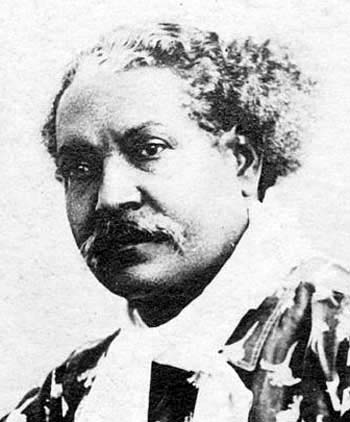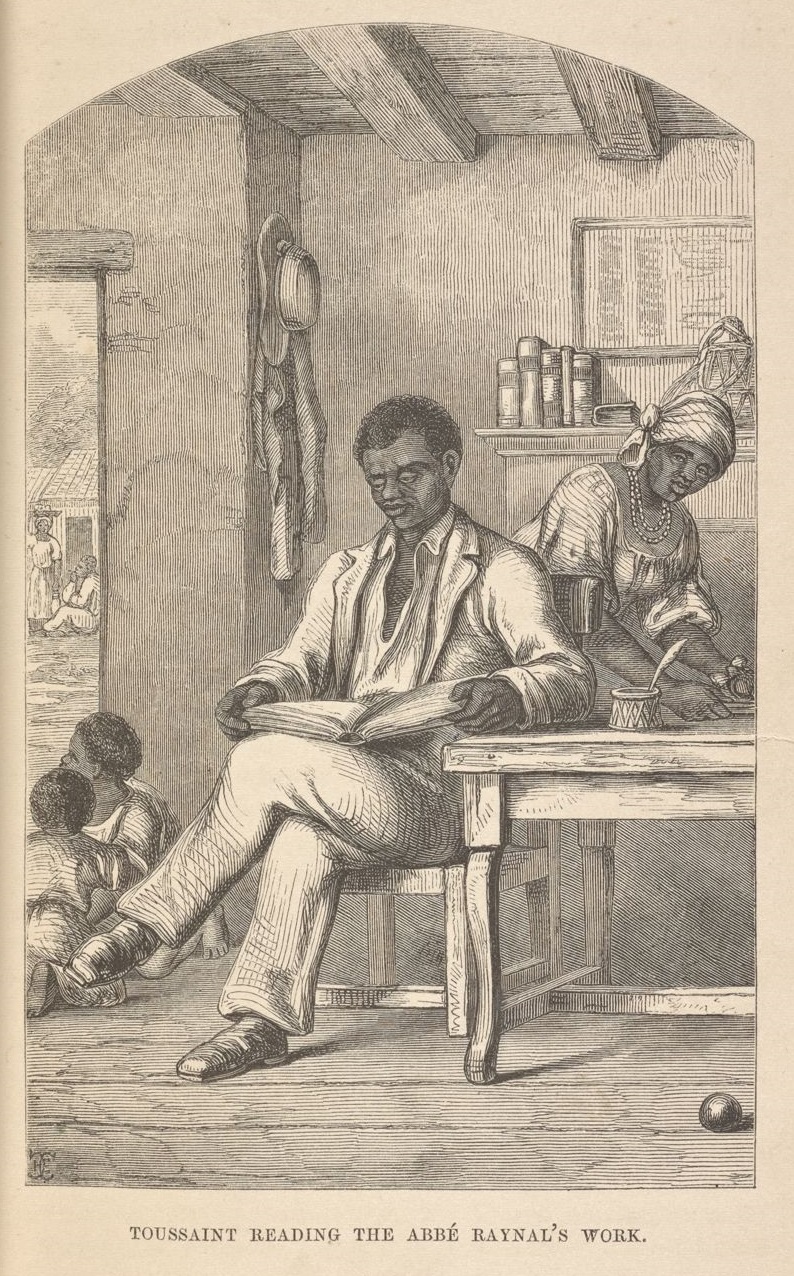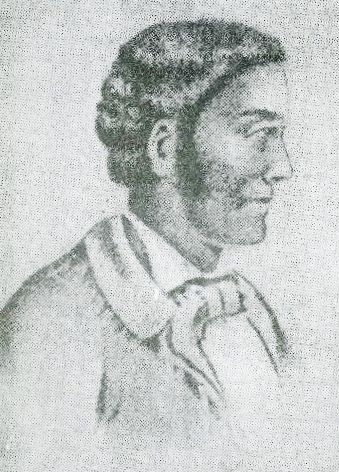|
Quand Nos Aïeux Brisèrent Leurs Entraves
("When our Fathers Broke Their Chains") was the unofficial national anthem of Haiti from 1893 to 1903. The lyrics were written by Oswald Durand, a Haitian writer and poet. History The was originally a poem written by Oswald Durand. In 1893, a visiting German warship set course to the Haitian capital of Port-au-Prince to stopover and by protocol that required that a national anthem be performed. At the time, Haiti did not have an anthem, so the composer Occide Jeanty offered to compose music to the patriotic poem and it was completed later that night. It debuted aboard the ship. It remained as an unofficial national anthem until officially became the national anthem commemorating the 100th anniversary of the Haitian Revolution on January 1, 1904. The anthem still remains in use as a presidential salute. Lyrics See also *La Dessalinienne *Flag of Haiti *Haïti Chérie *Music of Haiti References {{DEFAULTSORT:Quand nos Aieux briserent leurs entraves 1893 songs Haitian ... [...More Info...] [...Related Items...] OR: [Wikipedia] [Google] [Baidu] |
Oswald Durand
Oswald Durand (September 17, 1840 - April 22, 1906) was a Haitian poet and politician, said to be "to Haiti what William Shakespeare, Shakespeare is to England, and Dante Alighieri, Dante to Italy."P. Schutt-Ainé, ''Haiti: A Basic Reference Book'', 95 He was also a Haitian writer and poet of French and Creole expression, considered as the national poet of Haiti. Besides he was also judged as a Romantic poet and the most prolific one in the nineteen centuries. These 20th-century successors such as René Depestre, and Jacques Roumain congratulated Oswald Durand for his authentic expressions and honored him as a forerunner of Haitian indigenism. He was born in the northern part of Haiti, in the city of Saint-Louis-du-Nord, Saint-Louis du Nord. In 1842, both his parents died in the earthquake that devastated the city of Cape Haitian. Oswald Durand, and his sister, were welcomed in their maternal grandmother who raised them. He spent most of his childhood outside the city where he was ... [...More Info...] [...Related Items...] OR: [Wikipedia] [Google] [Baidu] |
François Capois
François Capois (or François Cappoix; 1766 – October 8, 1806, nicknamed Capois-La-Mort, also Cappoix-la-Mort, meaning "Capois-Death") was a Haitian officer in the Haitian Revolution (1791–1794) for independence from France. He was born in Port-de-Paix, Saint-Domingue on the island of Hispaniola, on the plantation of Laveaux/Lapointe. His name was a transformation of the name ''cappouet'', owner of the plantation. Military career His military career began in 1793 after a visit with independence leader Toussaint Louverture at Port-de-Paix. Then under the colonel Jacques Maurepas he was a member of the 9th brigade. His rank in the army changed quickly, first to Lieutenant, then to Captain of the 3rd Battalion. He participated under general Jacques Maurepas against all expeditions and invasions in the north-eastern region of the island. Capois is mostly known for his extraordinary courage and especially his herculean bravery at the Battle of Vertières in which the Fren ... [...More Info...] [...Related Items...] OR: [Wikipedia] [Google] [Baidu] |
French-language Songs
French ( or ) is a Romance language of the Indo-European family. It descended from the Vulgar Latin of the Roman Empire, as did all Romance languages. French evolved from Gallo-Romance, the Latin spoken in Gaul, and more specifically in Northern Gaul. Its closest relatives are the other langues d'oïl—languages historically spoken in northern France and in southern Belgium, which French (Francien) largely supplanted. French was also influenced by native Celtic languages of Northern Roman Gaul like Gallia Belgica and by the ( Germanic) Frankish language of the post-Roman Frankish invaders. Today, owing to France's past overseas expansion, there are numerous French-based creole languages, most notably Haitian Creole. A French-speaking person or nation may be referred to as Francophone in both English and French. French is an official language in 29 countries across multiple continents, most of which are members of the ''Organisation internationale de la Francophonie'' (O ... [...More Info...] [...Related Items...] OR: [Wikipedia] [Google] [Baidu] |
Haitian Songs
Haitian may refer to: Relating to Haiti * ''Haitian'', an adjective referring to something of, from, or related to Haiti ** Haitian Creole, a French-Creole based ** Haitian French, variant of the French language ** Haitians, an ethnic group * Haitian art * Haitian Carnival * Haitian cuisine, traditional foods * Haitian gourde, a unit of currency * Haitian patty, in culinary contexts * Haitian literature * Haitian mythology * Haitian Revolution * Haitian Vodou * Ligue Haïtienne (''Haitian League'') Other uses * Haitian (''Heroes''), minor character in the 2006 television series ''Heroes'' See also * Haitian−Qingdao railway The Haitian−Qingdao railway or Haiqing railway () is a railway in Shandong Province, China. The single-track railway connects Station in Changyi on the Dezhou–Longkou–Yantai railway in northern Shandong with Station in Gaomi on the Jiao ..., a railway in Shandong Province, China * * {{disambiguation Language and nationality disambiguation p ... [...More Info...] [...Related Items...] OR: [Wikipedia] [Google] [Baidu] |
1893 Songs
Events January–March * January 2 – Webb C. Ball introduces railroad chronometers, which become the general railroad timepiece standards in North America. * Mark Twain started writing Puddn'head Wilson. * January 6 – The Washington National Cathedral is chartered by Congress; the charter is signed by President Benjamin Harrison. * January 13 ** The Independent Labour Party of the United Kingdom has its first meeting. ** U.S. Marines from the ''USS Boston'' land in Honolulu, Hawaii, to prevent the queen from abrogating the Bayonet Constitution. * January 15 – The ''Telefon Hírmondó'' service starts with around 60 subscribers, in Budapest. * January 17 – Overthrow of the Kingdom of Hawaii: Lorrin A. Thurston and the Citizen's Committee of Public Safety in Hawaii, with the intervention of the United States Marine Corps, overthrow the government of Queen Liliuokalani. * January 21 ** The Cherry Sisters first perform in Marion, Iowa. ** T ... [...More Info...] [...Related Items...] OR: [Wikipedia] [Google] [Baidu] |
Music Of Haiti
The music of Haiti combines a wide range of influences drawn from the many people who have settled on this Caribbean island. It reflects French, African rhythms, Spanish elements and others who have inhabited the island of Hispaniola and minor native Taino influences. Styles of music unique to the nation of Haiti include music derived from rara parading music, twoubadou ''ballads'', mini-jazz ''rock bands'', rasin movement, hip hop Creòle, the wildly popular compas, and méringue as its basic rhythm. Haiti did not have recorded music until 1937 when Jazz Guignard was recorded non-commercially. One of the most current popular Haitian artists is Wyclef Jean. His music is somewhat hip hop mixed with worldbeat. Haitian music is influenced mostly by European colonial ties and African migration (through slavery). In the case of European colonization, musical influence has derived primarily from the French. One of Haiti's musical traditions is known to outsiders simply as compas ... [...More Info...] [...Related Items...] OR: [Wikipedia] [Google] [Baidu] |
Haïti Chérie
"Haïti Chérie" (: ''Dear Haiti'') is a traditional patriotic song of Haiti of a poem written by Othello Bayard that was initially called it ''Souvenir d'Haïti'' ("Memory of Haiti") and composed to music in 1925. It is widely considered as a second national anthem, and one of Haiti's most famous méringues. Lyrics :Ayiti cheri pi bon peyi pase ou nanpwen :Fòk mwen te kite w pou mwen te kapab konprann valè w :Fòk mwen te lese w pou m te k ap apresye w :Pou m santi vrèman tout sa ou te ye pou mwen :Gen bon solèy bon rivyè e bon brevaj :Anba pyebwa ou toujou jwenn bon lonbraj :Gen bon ti van ki bannou bon ti frechè :Ayiti Toma se yon peyi ki mè chè :Lè w lan peyi blan ou gen yon vye frèt ki pa janm bon :E tout lajounen ou oblije ap boule chabon :Ou pakab wè klè otan syèl la andèy :E pandan si mwa tout pyebwa pa genyen fèy :Lan peyi mwen gen solèy pou bay chalè :Diran lane tout pyebwa ap bay lonbraj :Bon briz de mè toujou soufle sou nos plaj :Ayiti Toma se yon ... [...More Info...] [...Related Items...] OR: [Wikipedia] [Google] [Baidu] |
Flag Of Haiti
The flag of Haiti ( French: , ht, drapo Ayiti) is the national flag of the Republic of Haiti. It is a bicolour flag featuring two horizontal bands coloured blue and red, emblazoned by a white rectangular panel bearing the coat of arms of Haiti. The coat of arms depicts a trophy of weapons atop a green hill and a royal palm symbolizing independence. The palm is topped by the Cap of Liberty. The motto ''L'Union fait la Force'' ("Unity makes strength") appears on a white ribbon below the arrangement. Present design National flag The present design was first used by the Republic of Haiti under President Alexandre Pétion in 1806. It was most recently readopted on 25 February 2012 under Title I, Chapter I, Article 3 of the current Constitution of Haiti:L'emblême de la Nation Haïtienne est le Drapeau qui répond à la description suivante: The English translation adopted by the Embassy of Haiti in Washington, D.C., reads:The emblem of the Haitian Nation shall be a flag with ... [...More Info...] [...Related Items...] OR: [Wikipedia] [Google] [Baidu] |
Toussaint Louverture
François-Dominique Toussaint Louverture (; also known as Toussaint L'Ouverture or Toussaint Bréda; 20 May 1743 – 7 April 1803) was a Haitian general and the most prominent leader of the Haitian Revolution. During his life, Louverture first fought against the French, then for them, and then finally against France again for the cause of Haitian independence. As a revolutionary leader, Louverture displayed military and political acumen that helped transform the fledgling slave rebellion into a revolutionary movement. Louverture is now known as the "Father of Haiti". Louverture was born enslaved on the French colony of Saint-Domingue, now known as Haiti. He was a devout Catholic who became a freeman before the revolution and, once freed, identified as a Frenchman for the greater part of his life. During his time as a freeman he attempted to climb the highly stratified social ladder on the island, combatting racism whilst gaining and losing much wealth while working as ... [...More Info...] [...Related Items...] OR: [Wikipedia] [Google] [Baidu] |
Vincent Ogé
Vincent Ogé ( – 6 February 1791) was a Dominican Creole revolutionary, merchant, military officer and goldsmith best known for his role in leading a failed uprising against French colonial rule in the colony of Saint-Domingue in 1790. A mixed-race member of the colonial elite, Ogé's revolt occurred just before the Haitian Revolution, which resulted in the colony's independence from France, and left a contested legacy in post-independence Haiti. Born on Saint-Domingue into a slaveholding family, Ogé was sent at the age of eleven to the city of Bordeaux, France by his parents to be apprenticed to a goldsmith. Returning to the colony after seven years, he settled down in Cap‑Français as a coffee merchant in the employ of his uncle, acquiring partial ownership of his family's plantation. By the 1780's, Ogé's business dealings had made him the richest merchant of African descent in the city. In 1788, Ogé travelled to France to both clear his debts and bring several lawsui ... [...More Info...] [...Related Items...] OR: [Wikipedia] [Google] [Baidu] |
Jean-Baptiste Chavannes
Jean-Baptiste Chavannes ( – 23 February 1791) was a Dominican Creole abolitionist, and rebel soldier. Biography He was the son of rich mulatto parents, and received a good education. In 1778 the expedition under d'Estaing, who sent the Chasseurs-Volontaires de Saint-Domingue to assist the U.S. Continental Army, Chavannes was one of those who had volunteered. He distinguished himself during the operations in Virginia and New York, and specially during the retreat from Savannah in December 1778. Once the independence of the American colonies had been accomplished, Chavannes returned to Saint-Domingue. When Vincent Ogé landed near Cap-Français, 23 October 1790, intending to create an agitation amongst the people of African descent in favor of their political rights, Chavannes sided with him. Chavannes wanted all the slaves to be declared free, but Ogé did not follow his advice, and informed the assembly of his intention to take the opposite course. The mulattoes raised a ... [...More Info...] [...Related Items...] OR: [Wikipedia] [Google] [Baidu] |
Battle Of Vertières
The Battle of Vertières ( ht, Batay Vètyè) was the last major battle of the Haitian Revolution, and the final part of the Revolution under Jean Jacques Dessalines. It was fought on 18 November 1803 between the indigenous Haitian army and Napoleon's French expeditionary forces, who were committed to regaining control of the island. Vertières is situated just south of Cap-Haïtien (known then as Cap-Français), in the Départment du Nord, Haiti. By the end of October 1803, the forces fighting the expeditionary troops had already taken over most of the territory of St. Domingue. The only places controlled by the French forces were Môle St. Nicolas, held by Noailles, and Cap-Français, where, with 5,000 troops, French General Rochambeau was at bay. Background In 1802, the revolutionary leader Toussaint Louverture was captured by Napoleon's troops. From the ship that would lead him to his prison cell, and eventual death, Louverture said: “In overthrowing me, you have ... [...More Info...] [...Related Items...] OR: [Wikipedia] [Google] [Baidu] |




